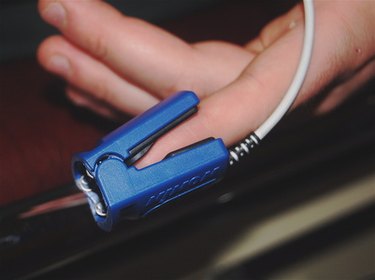
A normal resting heart rate for a healthy adult is somewhere between 60 and 80 beats per minute, according to the American Heart Association. When heart rate habitually drops below 60 beats per minute, the condition is called bradycardia. Young adults or active athletes may have a slow heart rate without problems, but for many senior citizens, bradycardia is symptomatic of more serious conditions and may require the implantation of a pacemaker.
Causes
Video of the Day
Aging leads to a general weakening of the heart, which can cause a slow heart rate. Other causes often associated with older adults include the after-effects of a heart attack, low thyroid production, high blood pressure, heart infections and inflammatory disorders. The medications prescribed to manage these conditions can also be the cause of a slow heart rate. For example, drugs designed to lower blood pressure can also lower heart rate.
Video of the Day
Symptoms
Most of the symptoms associated with bradycardia—fatigue, lightheadedness, cognitive difficulties, sleep disorders and fainting—are due to the brain receiving inadequate blood flow. Other symptoms may accompany a slow pulse rate if bradycardia is caused by an underlying heart or autoimmune condition such as lupus.
Risks
Though a slow heart rate is not necessarily harmful to young adults, senior citizens should take the condition seriously. Untreated bradycardia can have serious, even life-threatening, results, including fainting, heart failure and cardiac arrest, according to the Mayo Clinic. The seriousness of the consequences depends on what is causing the bradycardia, how severe it is and the health of the affected heart tissue. The Mayo Clinic advises anyone having a consistently slow heart rate to consult a doctor right away.
Treatment
Many people have a low heart rate with few, if any, symptoms. According to the American Heart Association, treatment is usually not necessary in these cases. However, if insufficient blood is flowing to the brain and producing symptoms such as constant fatigue, fainting episodes or an inability to think clearly, treatment may be required. If medications are triggering the low pulse rate, a doctor may eliminate the drug or substitute another. In serious cases, a pacemaker can be implanted to keep the heart rate normal.
Prevention
Lowering your risk of heart disease is the best way to avoid a slow heart rate as a senior citizen, according to the Mayo Clinic. Eating a nutritious diet and maintaining a healthy weight nourish your heart tissues and decrease stress on the heart. Regular exercise strengthens the heart muscles and increases circulation. Routine medical examinations can discover whether you need medications to control high blood pressure, high cholesterol or an underactive or overactive thyroid. Seeing your doctor regularly can also insure that your medication is not causing unwanted side effects such as a slow heart rate.